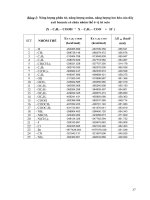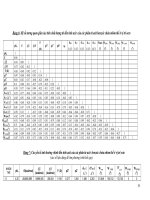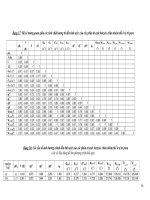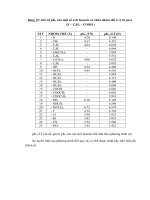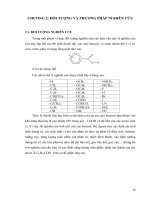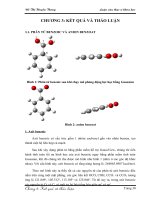Soil structure interaction su anh huong cua ket cau hat
Bạn đang xem bản rút gọn của tài liệu. Xem và tải ngay bản đầy đủ của tài liệu tại đây (126.69 KB, 3 trang )
GEO-SLOPE International Ltd, Calgary, Alberta, Canada
www.geo-slope.com
Dynamic Soil Structure-Interaction
1
Introduction
The response of the ground can be influenced by the rigidity of a structure. Stated conversely, the
presence of a stiff structure could possibly affect the response of the ground to earthquake shaking.
QUAKE/W has not been formulated with the intent of analyzing the dynamic response of structures to
earthquake shaking, but QUAKE/W does have beam and bar elements, which can be used to consider the
structural stiffness in a dynamic analysis.
Figure 1 shows the possibilities. The building pile foundation is included as beams. The building frame is
modeled with structural bars.
Figure 1 Example of including a structure in a dynamic analysis
Structural beams and bars in QUAKE/W have no mass. Generally, the mass of the structural elements is
small relative to the soil mass, and consequently, their mass is of little importance. The stiffness is
extremely important, but not the mass.
In the case of a building like in this example, the mass of the building may, however, have some influence
on the ground response. If this is deemed important, the mass can be included in regular elements within
the frame. In the above diagram, the top floor of the building has one element within the frame. The
element has been assigned a small unit weight and a small stiffness. The cross-sectional area of the
element times the unit weight might be made equal to the weight of the frame. The G modulus could be
set to a small number, so that the shear in the elements does not absorb a significant amount of the energy.
Analyses are included for a case without any mass in the frame, and a case with some mass in the frame.
QUAKE/W Example File: Soil-Structure Interaction.docx (pdf) (gsz)
Page 1 of 3
GEO-SLOPE International Ltd, Calgary, Alberta, Canada
2
www.geo-slope.com
Purpose
The primary purpose of this example is to illustrate some modeling techniques and to check the behavior
of beam and bar elements in a dynamic analysis.
No attempt is made here to simulate a real case. The soil and structural properties are completely arbitrary
and were selected purely for illustrative purposes.
3
Typical results available
Figure 2 illustrates the axial force variations in the piles during the earthquake. These forces do not
include the static forces - they are only the dynamic forces.
Pile
15
Y (m)
14
13
12
11
10
-30
-20
-10
0
10
20
30
40
50
Axial Force (kN)
Figure 2 Axial force in the piles during the shaking
QUAKE/W Example File: Soil-Structure Interaction.docx (pdf) (gsz)
Page 2 of 3
GEO-SLOPE International Ltd, Calgary, Alberta, Canada
www.geo-slope.com
Figure 3 shows a plot of the axial forces in the two lower-floor cross members. Note how they change
from tension (negative) to compression and how they have opposing tension and compression, as they
properly should.
50
40
30
Axial Force (kN)
20
10
0
-10
-20
-30
-40
-50
0
2
4
6
8
10
Time (sec)
Figure 3 Axial dynamic forces in the cross members in the lower floor
Remember that structural elements in QUAKE/W do not include the mass of the beams and bars – only the stiffness
and rigidity.
4
Concluding remarks
QUAKE/W is not intended for analyzing the dynamic behavior of structures for the purpose of designing
the structure itself. Estimates of the building rigidity can, however, be included in an earthquake ground
response analysis.
This example illustrates some modeling techniques used to include the effects of a structure, including the
mass of the structure, in a QUAKE/W analysis.
This example also demonstrates that the structural elements in QUAKE/W function in accordance with
expectations.
QUAKE/W Example File: Soil-Structure Interaction.docx (pdf) (gsz)
Page 3 of 3

